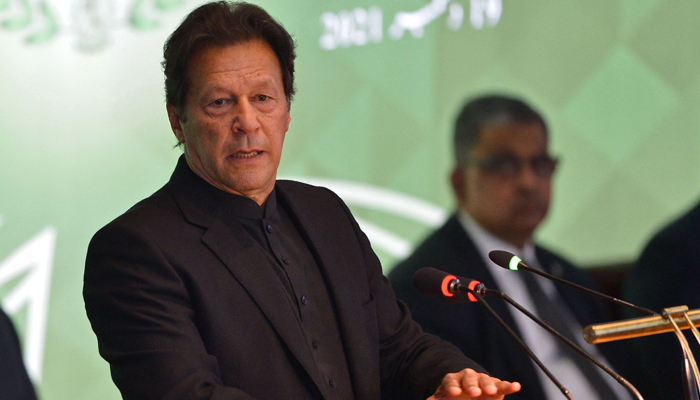After the ECP verdict
Imran Khan might have strong legal and technical arguments in this case – but on moral grounds his position is weak
October 24, 2022

The Election Commission of Pakistan, in a unanimous decision, has disqualified former prime minister Imran Khan in the Toshakhana reference under Article 63(1)(p) of the constitution. With that, he has been declared to no longer be a member of the National Assembly.
Apart from the disqualification, he will face legal proceedings under Sections 137, 167 and 173 of the Elections Act, 2017 for committing the offence of corrupt practices which is punishable under Section 170 of the Elections Act.
The ECP has drawn the following conclusions: “As a sequel to our abovementioned findings, facts available on record and keeping in view the argument of learned counsel for parties herein, we are of the considered opinion that the respondent has become disqualified under Article 63(1)(p) of the constitution read with Section 137, 167 and 173 of the Elections Act, 2017, consequently he ceases to be a member of the National Assembly of Pakistan and his seat has become vacant accordingly”.
“As the respondent has made false statements and incorrect declarations, therefore he has also committed the offence of corrupt practices defined under Sections 167 and 173 of the Elections Act, 2017, punishable under Section 174 of the Elections Act, 2017. The office is directed to initiate legal proceedings and to take follow-up action under Section 190(2) of the Elections Act, 2017.”
So, it is clear that disqualification under Article 63(1)(p) is temporary – for the time being. In all probability, if the high court and Supreme Court uphold the order of the ECP, even then Imran Khan will only be barred from holding a National Assembly seat in the current parliament and will be eligible to contest the next general elections unlike Nawaz Sharif.
But there will be other legal consequences for him if the high court and Supreme Court uphold the ECP order. The ECP could initiate legal proceedings on the allegations of corrupt practices in the district and sessions court. But it will be a long-drawn legal battle.
With his disqualification, Imran Khan has joined the league of disqualified former prime ministers Nawaz Sharif and Syed Yousuf Raza Gilani. I know Imran Khan hates to be tagged with PML-N and PPP leaders but that is how it is.
But Imran Khan is lucky compared to the other two former prime ministers who were disqualified by the Supreme Court under Article 62(1)(f) of the constitution without having the right of appeal. Their disqualification was final.
Imran is lucky in the sense that he has two forums to challenge the ECP order. He might be able to overturn his onetime disqualification in a high court or in the Supreme Court. In this sense, the ruling coalition’s jubilation over Imran’s disqualification might be short-lived. Let the courts decide legal matters.
This disqualification might fail to make a big political impact. Imran’s die-hard supporters and followers already believe that he has been targeted by the powers that be and this decision of the ECP is part of the process to oust Imran from politics. His disqualification might not be as politically damaging as was the disqualification of Nawaz Sharif for the PML-N.
We must remember that the ECP’s decision in the foreign funding case failed to dent his support. There is no doubt that he is still the most popular political leader in the country. The results of the recent by-polls clearly reflect this popularity. Imran Khan won six out of the seven seats he himself contested.
But Friday’s poor turnout of PTI workers and supporters in the protests against his disqualification has raised serious questions on the organisational ability of the PTI whose leaders failed to mobilise supporters in big numbers even when they had a free hand in Khyber Pakhtunkhwa and Punjab. The PTI put up a poor show, also highlighting the weak link between the personal popularity of Imran Khan and the organisational strength of the PTI. This should be a matter of concern for the party.
This disqualification will be used by the ruling coalition to build a narrative against Imran Khan. But only time will tell whether the ruling coalition will be able to manage that. The experience of the last six months clearly shows that the strategy to attack and target Imran Khan is not simply working. The ruling coalition lacks a clear narrative to convince independent and young voters. Without improving its economic performance and bringing down the inflation, it seems that it will be hard for the ruling coalition to improve its political fortunes. Economic performance is going to be a make-or-break point for it.
On the other hand, Imran might have strong legal and technical arguments in this case – but on moral grounds his position is weak. He has over the years built his image of a clean man who has never been involved in corruption or financial wrongdoing. The Toshakhana case raises serious questions on his conduct as prime minister.
It is true that other former prime ministers and presidents also bought expensive gifts from Toshakhana at cheap rates under the rules. But they all kept these gifts. Imran, however, sold the gifts and pocketed the profits earned through the sales. He also tried to hide details of the gifts.
The writer is a freelance journalist.
Originally published in The News











